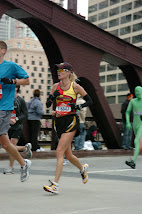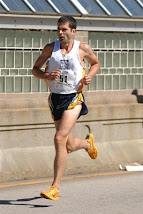A response to Ms. Adrienne Wald in "Plodders Have a Place, but Is It in a Marathon?" featured in The New York Times by Juliet Macur on October 22, 2009.
I was relaxing in the tub with the latest issue (#373, January / Februrary 2010) of Running Times, when I read the following QUOTABLE section (page 9):
“It’s a joke to run a marathon by walking every other mile or by finishing in six, seven, eight hours,” said Adrienne Wald, 54, the women’s cross-country coach at the College of New Rochelle, who ran her first marathon in 1984. “It used to be that running a marathon was worth something—there used to be a pride saying that you ran a marathon, but not anymore. Now it’s, ‘How low is the bar?’ ”
Alerted by the quote, I wanted to find the context. Within a few clicks, I found the original article from The New York Times, cited above.
I am fuming and am so disappointed and disheartened with such an attitude, my thoughts catch fire. And I'm really not sure where I sit on Ms. Wald's hierarchy of "deserving" marathon runners. Perhaps I have ruined her running career also, stripped it of worth, depleting any value in her pride of running a marathon with my sluggish times ranging from 4:17 (my first) to 3:38 (my most recent). But regardless of however worthless a marathoner I am in her eyes, I will happily defend the rights of even slower marathoners across the world to toe the starting line--and experience the thrill of crossing it 26.2 miles later.
So, as controversial as this blog entry might be, I am going to vent through a few reasons why everyone should have the right to experience the dream of finishing a marathon: whether it is their first, their last, their only or their slowest.
1. Not all marathon runners are about the time. One of the people I work with on his marathoning explained it this way: "When I ran my first marathon, I was carrying ribbons for people with cancer. I would have crawled to get them across the finish. It was not about the time." As he raised thousands of dollars for cancer research in honor of loved ones, he further explained, "The world class God-gifted athlete is an inspiration--a thing of beauty. An average runner hitting a PR is a success. But, getting from start to finish is to some a life-giving effort."
Just to take the benefits of one well-known fund-raising society, In 2008, Team In Training has had more than 360,000 volunteer participants raise over $850 million to support blood cancer research and patient services for the Leukemia and Lymphoma Society. The Society uses at least 74 cents of every dollar raised for cancer programs, funding research to find cures to leukemia, Hodgkin's and non-Hodgkin's lymphomas, and myeloma--the blood cancers--as well as assistance with the often overwhelming burdens faced by patients and their families currently fighting blood cancers. Many of those runners are known for their slower times, but yet, perhaps their running and completing a marathon event benefits others more than Ms. Wald's running and completing a marathon.
2. The marathon is big enough for everyone. As long as everyone generally does a good job of estimating their pace, the fast runners, the middle-of-the-packers and the back-of-packers are all well separated from each other. Particularly with the larger races where there are starting corrals, mistakes of where to line-up largely cannot be made. Ms. Wald, the really fast guys (and gals), the top 100 won't even know the rest of us exist. We're frankly not running the "same" race, and no one would mistake us for competing with Deena Kastor, Kara Goucher or Ryan Hall.
3. Local Economy boost. When a city is holding a major marathon event of 10,000 runners or more, everybody wins. The local food, hospitality and retail industries all benefit. People often plan their vacation dollars around prime location events. Large marathons benefit the community economy as a whole.
4. Bigger marathons can give a richer experience. Bring in 10,000, 20,000 or even 40,000 people and you get world-class expos where runners can be exposed to a dream world of running gear, motivational speakers, health products, etc. And the power and the energy of running along with crowds in the hundreds of thousands is so exciting. The more runners you have, the more spectators you have.
5. Inspirational stories. Just because someone completes a slow marathon doesn't mean they will always be--or were--always slow. But, regardless, the stories that people have to tell of their experience in preparing for and overcoming obstacles--even for a slow finish--are positively inspiring. Here are a couple, one I don't know, and one that is very close to me.
Major Phil Packer, who lost the use of his legs in a rocket attack in Iraq last year, finally crossed the London Marathon finish line in thirteen days. He completed his Herculian task - covering the 52,400 steps of the 26.2-mile course at a rate of two miles a day, the maximum distance he was advised to attempt by doctors--to raise a million pounds for the charity Help for Heroes--which provides financial assistance for wounded British servicemen.
From one of the runners I've recently worked with (beginning in August, after he already had a stress fracture), here's a story that hasn't been told.
In his night before the marathon, he wrote to me:
"As a Greek I was raised with stories of ancient Greece. When Spartan mothers would say their goodbyes to their sons before they went into battle they would give them their shields and say, H TAN H EPI TAS--"Come back with it or upon it." I go in that spirit tomorrow."
And after that race, as he shared his experience and race photo at the start:
"I was the absolute LAST person to cross the start line. I planned it that way so I could savor the moment since it was, in reality, a finish line, if you know what I mean. I was happy when I crossed the finish line, but I cried when I crossed the start line. I don't know if I told you that I am 55 and am a cancer survivor--diagnosed with stage 4B Hodgkins Disease in 1983 and in remission since 1984. I could never have done this without you. You helped me to win twice today--by starting and finishing. I will always deem the medal to be half yours, if not all yours. I suffered the stress fracture in late June, missed all of July & August, and only had five weeks or so with short runs for the first few weeks and tapering at the end. Into this scenario came your words, 'You CAN finish.' "
I will tell you, I was more moved by his experience, and coming back WITH his shield, and not upon it, than the thing of beauty of an elite marathoner flying over the finish line. I cried for him and with him at that victory.
And I would never presume to deny anyone the dream of finishing a marathon, whatever their motivation might be.
2026 One City Marathon Week 7
5 days ago








Thank you. I guess according to Adrienne Wald I have no business running. My first marathon was just under 6 hours, carrying a ribbon and fundraising for TNT in honor (now in memory) of a loved one. I did not become hooked on endurance sports or healthy lifestyle until after this experience. I guess Adrienne is not happy with the level of obesity as it is, she wants more people to be sedentary. Anything that gets people moving is good in my book!
ReplyDeleteThank you for sharing your thoughts on the NYT article. I read the article when it first appeared online and it really made me mad!! I am slowly in the process of rebuilding my mileage after being sidelined for one year from bilateral pelvic stress fractures. I lost so much during that very difficult year...including my speed. I often wonder if I will ever be fast again as I now struggle with a pace that I used to consider a "grandma" pace. This injury has humbled me and if I ever have the privilege to cross a starting line (and get there healthy) I will cry tears of joy. I no longer care about my time, rather just finishing the race. I wonder if Ms. Wald would change her opinion if she found herself injured and wondering if she would ever run again. In the words of John Bingham: Waddle on! And be proud no matter what your time :)
ReplyDeleteRick, You bring up an important point that occurred to me, but I didn't develop in my thoughts here. Anything to motivate people to get up off the "couch of doom" (as Steve Runner, Phedippidations would say) is a GOOD THING. It's extremely inspiring to watch someone work so hard for a marathon, losing weight, getting moving, and doing something positive! I can't imagine a better activity for the health of this nation. --Alex
ReplyDeleteSharon, You know, I spent a little bit of time searching to see if I could find exactly what her marathon times were. And, she's 54 now, what if she runs a marathon when she's 80? Wonder how she'll feel when just age creeps up on her, and nothing else? The stories of the triumphs of "every day" athletes like you and me crossing the finish line, no matter what the time, is more awe inspiring than any story Ms. Wald might have to tell. --Alex
ReplyDeleteI know, have run with, and like Adrienne. She speaks her mind. She stirred up a fair chunk of discussion with her remark and I won't attempt to speak for her (and I haven't seen her since).
ReplyDeleteI've written about the standards to which I hold myself in deciding to race (not run) a marathon or any other event. To me, the most important thing, though, is respecting the distance. By that I mean putting in the effort required to get to the finish in a respectable time for you. I had nothing but respect for my niece who ran NYC in 2006, and I was happy to post her story. I've come to know a number of bloggers who train for the marathon. They have various paces but they share the desire to run the best damn marathon they can run, whatever it may be. They succeed, they fail. But they're all part of the running community.
Not so for those who decide that "finishing" a marathon is enough. It's elitist, but it's not because of time. It's because of dedication. Your points are well taken. I don't care about the tens of thousands behind me. I think running for a charity is a good thing if you choose to do it -- you can listen to Marci talk about her efforts in a RunnersRoundTable I hosted. I'm all for inspirational stories, but I don't think Steve Runner should have done Boston last year on virtually no training. Same for your Greek friend. I don't see how we as athletes who prepare diligently for the task can find that laudable.
Finally, I think it is bad for people to take up running because they want to run a marathon. Doing a marathon is a major undertaking, and it seems to me that there are those who don't believe they are real runners until they've done one. These hypothetical people don't give themselves time to, figuratively, walk before they run.
In the end, you're wrong. Racing a marathon is about time. OT qualifier, BQ, sub-3, sub-4, whatever, it's all about time. Not my time, your time, the "higher goal" to which you aspire.
Runwestchester, I really appreciate your points and am glad you took the time to write such a thorough response. And I totally understand where you are coming from. I completely agree that many marathoners don't have much respect for the event, and don't consider it a timed event. I also agree that racing a marathon is about time. I just don't think everyone is there to race. And I'm not so sure that is a bad thing.
ReplyDeleteI also think that people who want to do something fun, interesting or different might complete a marathon... and be changed forever. Everyone has to start out somewhere. It's a better activity than so many others they could be doing.
I don't think that their participation cheapens the experience. --Alex
I hate your blog because it doesn't let me comment using my name (Joe Garland). Oh well.
ReplyDeleteIn the end, I don't think, Alex, that you're so different from Adrienne, or me. You see a distinction between people like us and people for whom the purpose of doing a marathon is finishing a marathon, time be damned. But that is a difference not in degree but in kind. They are different from us. In the old days, one ran a marathon to see how fast she could be.
And racing a marathon is something special, built on what happened on race day and in the weeks, and months, and even years before. That experience is not cheapened by what others do, but there's something wrong in saying that someone who doesn't train much but finishes has somehow accomplished the same thing that a, for want of a better phrase, a "real marathoner" has done. So I don't entirely disagree with Adrienne that:
"It used to be that running a marathon was worth something—there used to be a pride saying that you ran a marathon, but not anymore. Now it’s, ‘How low is the bar?’"
Consider. You go to Boston and get one of those BAA marathon jackets. You look over as you wait at the Expo register to pay and see some really slow guy who got in via a charity buying the same jacket, albeit in a larger size. What do you think?
Ciao.
i can't believe i never saw this comment. i think even less of this man than i ever have (if that is possible). "some really slow guy who got in via a charity buying ...in a larger size?" this TOTALLY implies that people who are slow have not put in any effort, are fat, and that charity runners as a rule don't train as hard as "real marathoners". i can't believe this idiot was my coach. what an absolute jerk. i'm ashamed that i ever thought anything of him as a runner. i wish boston would dq runners with attitudes such as his. and ms wald's.
DeleteJoe, I love this discussion. You have steeled my resolve to post some other interesting topics, so look for those to come in the future. :-)
ReplyDeleteYou did hit a hot button with me--on Boston. A year and a half ago, I was offered a bib for free from a company with which I was doing business. I turned it down. I knew I would only run Boston IF and ONLY IF I qualified. It means something to me to have met the qualifying standard by a wide margin, and I will cherish that BAA jacket as something I have earned.
I never wanted to have the discussion, "So, you qualifed?" "Er, no, not exactly...". I did qualify and I worked my proverbial you-know-what off for it. And I relish every moment of that success.
Similarly, I will not apply for the NY lottery. I have to run a 3:38:00 in order to acquire a spot, something that I missed by 22 seconds in Chicago '09. Not to worry, I will make it this year, and it wasn't even on the table of goals last year.
However, I would hope that for some potential running enthusiasts that get to have the experience of a marathon... however slow, might raise their standards next time and begin that steady ever-ascending rise we experience as runners. Not everyone is there to race, and maybe that isn't such a bad thing.
I know why I run.
Best, --Alex
Alex, I'll let you have the last word on this. Except, of course, for this. I look forward to your future posts.
ReplyDelete